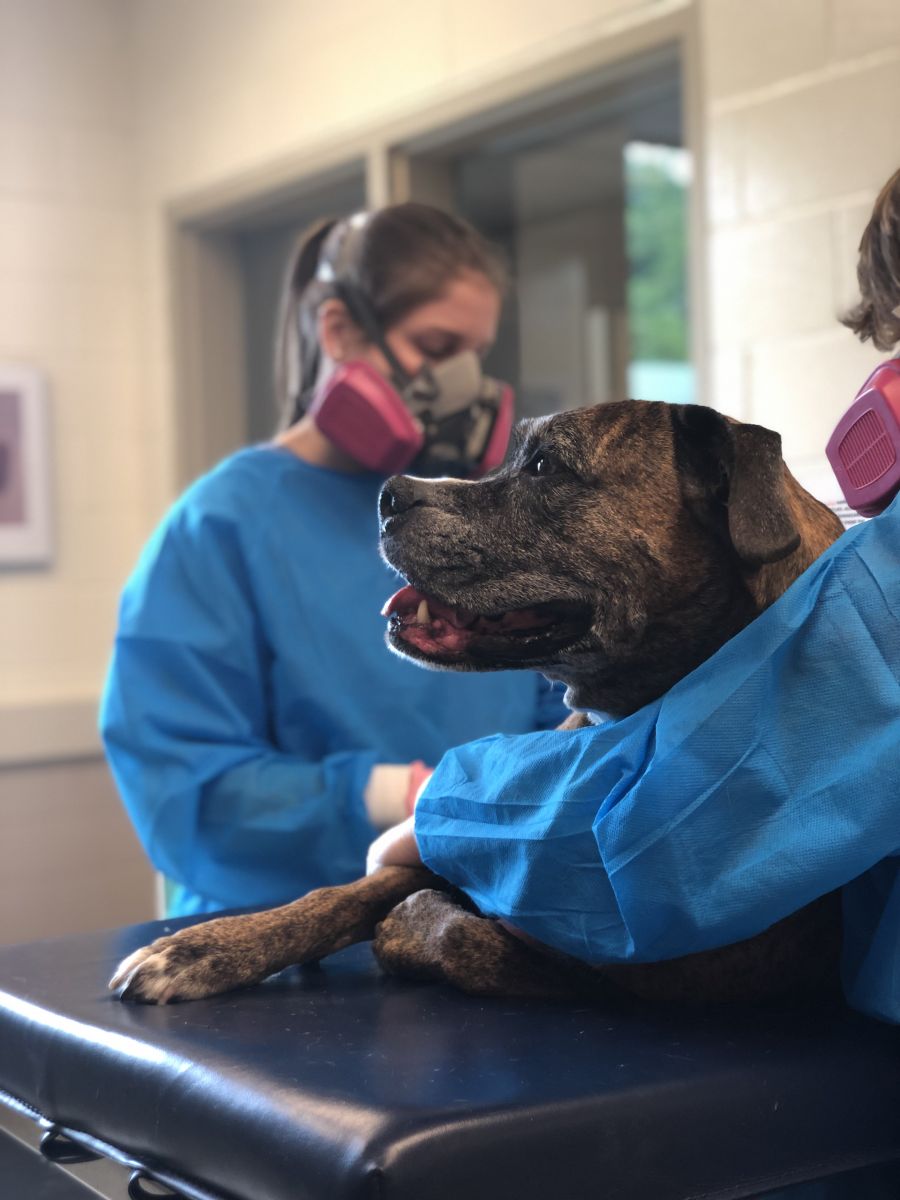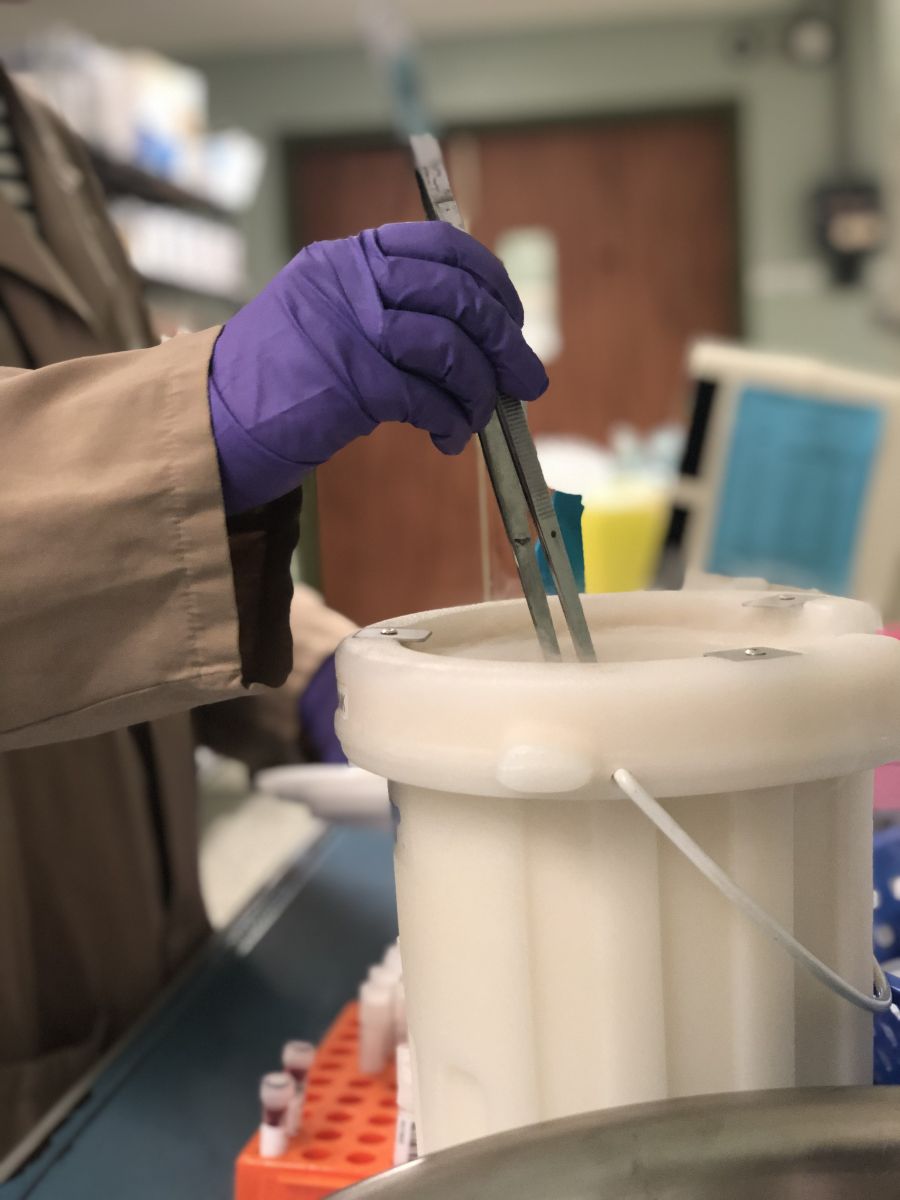Exploring the possibilities of comparative oncology.
Multi-centre clinical trial investigates vaccine for dogs with bone cancer; findings may hold promise for human cancers.
.jpeg)
“We made the decision for Bella to be part of a clinical trial for the future; not just so we would have more time with her, but so that, maybe, one day, down the road, these medical discoveries will help children and their parents who are dealing with cancer.” - Bella's family (pictured).
Bella, an eight-year-old Boxer, hops through the doors of the Mona Campbell Centre for Animal Cancer at the Ontario Veterinary College (OVC), University of Guelph (U of G). You’d never know she had undergone major surgery only two weeks prior. Bella’s left rear limb was amputated after she was diagnosed with osteosarcoma (OSA), the most common type of bone cancer in dogs.
OSA is an aggressive and invasive cancer that progresses in dogs in much the same way it does in people such as Terry Fox, destroying bone most local to the tumour, with a high rate of metastasis, secondary cancer that spreads to other parts of the body. Most common in larger breed dogs, OSA typically occurs in middle-aged or older dogs but can affect younger dogs. The median lifespan from the time of diagnosis is one year with treatment but only a few weeks to months without treatment.
Bella has returned to OVC to continue her standard of care treatment protocol of chemotherapy; her owners, Chris and Jessica McGraw, also hope Bella will be part of something bigger. Bella is enrolled in a clinical trial aimed to help future pets with OSA and maybe even people too.

The trial is part of the work of a collaboration that spans North America. The group is investigating the use of a listeria vaccine which has been genetically modified. The vaccine targets a gene called HER2, which controls a type of protein on the surface of cells that helps them grow. The hope is to improve survival time in dogs.
Building on preliminary research conducted in 2016 at the University of Pennsylvania, which found the administration of the listeria vaccine in dog OSA patients delayed the incidence of metastatic disease and prolonged overall survival, the multi-centre clinical trial now aims to dig deeper and uncover how the results of that initial study stand up to more rigorous, scientific examination.
Funded by the Morris Animal Foundation and utilizing the network of the National Institutes of Health (NIH)’s Comparative Oncology Trials Consortium (COTC), the clinical trial is currently underway at 11 locations across North America, with OVC being the only Canadian location.
Veterinary oncologist and co-director of the U of G’s Institute for Comparative Cancer Investigation, Dr. Paul Woods, is directing the study at OVC.
“When OSA spreads it usually invades the lungs, or another bone or tissue in the body,” Woods explains.
“While the current standard of care, surgery followed by chemotherapy, does a good job of slowing down the spread of this aggressive cancer, unfortunately, the cancer will eventually come back, similar to the cancer’s behaviour in people.”
.jpg) So, how can we do better?
So, how can we do better?
The research team is investigating a new treatment option to train the dog’s immune system to attack the OSA when it reappears.
Immune therapy, also called immunotherapy, is a biological treatment that may hold the answer. Similar to a drug, but utilizing the immune system, the therapy acts against a specific target in cancer cells and can function like a vaccine or an antibody to fight disease.
Bella is one of the dogs participating in the OSA clinical trial at OVC. After her diagnosis and amputation surgery, she completed a chemotherapy protocol and then received the first administration of the recombinant listeria vaccine used in the trial in September. To take part in the trial, veterinary patients’ owners, like Bella’s, give consent for their dog to participate and then receive the standard of care, plus the immunotherapy (vaccine) treatment.
The hope is to increase the length of survival and potentially even cure OSA for dogs like Bella. “If, with the vaccine, we can delay the reappearance of OSA, we will have better control,” Woods says. “Then, when the cancer returns, the immune system will be ready to fight back.”
Woods is hopeful the results from the trial will have translational relevance for the treatment of children with bone cancer and perhaps other cancers in humans.

“Funds directed to the cancer centre through OVC Pet Trust position us to be a key partner in the search for answers. OVC’s membership in the NIH Consortium allow us to offer patients like Bella access to the most innovative treatments in Canada. We have been able to collaborate in this important group because of our advanced facilities and equipment, diverse patient caseload and our team of specialists on the frontline of care,” Woods explains.
At the end of the day, Woods says quality of life is of utmost importance for his patients.
“For pets who are involved in clinical trials —we are hoping participation will help lead to improved results for themselves or others, but it is important to understand there are never any guarantees. Even if it doesn’t provide solutions for patients today, it is important for pet owners, like Bella’s, to understand the incredible gift of hope they are giving for future pets, and maybe even people too.”
Jessica describes what it means to her family that Bella was able to be treated and be involved in giving back to the future of medicine: "Our family was so blessed to call Bella ours, but now she gets to be a blessing to so many others because of this [clinical] trial. Thank you to everyone who cared for our family and our beloved dog during this time: your love, support and tears will never be forgotten."
Editor's Note: Bella died on November 5, 2019 at the age of eight years old, after a courageous battle with bone cancer.
Read more in the fall / winter issue of Best Friends Magazine.

